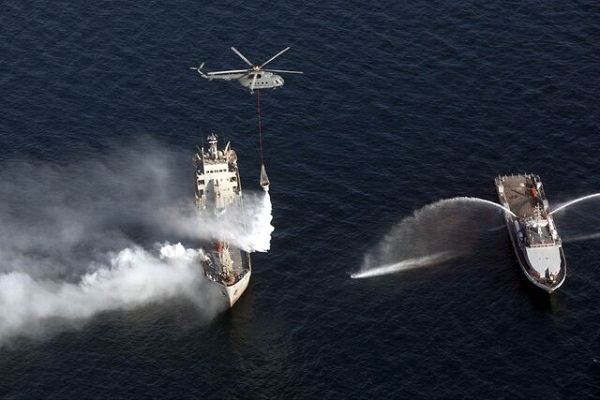
TABNAK, Oct, 21: IONS 2024 Joint Naval Exercise was held with participation of Iran, Russia and Oman on October 19 and 20 in the northern Indian Ocean region in southern Iran.
Saudi Arabia, India, Thailand, Pakistan, Qatar and Bangladesh were also present as observers in this exercise.
The naval units of the Islamic Republic of Iran Army and the Islamic Revolutionary Guard Corps, including Jamaran and Alborz destroyers, armored missile launchers, Shahid Soleimani float, Almas floats, as well as floats from Oman and Russia, were present in the drill.
"The most important goal of the exercise is to create coordination and cooperation among the countries bordering the Indian Ocean and regional countries working effectively for improving security and fighting security challenges," said the maritime exercise Spokesman Admiral Mostafa Tajeddini.
“We hope that with the cooperation of these countries, we will witness more humanitarian actions and fight against environmental pollution in sea areas. This exercise was planned to deal with security challenges of the North Indian Ocean region.”
“We had some challenges in the Indian Ocean, but we have not had any security incidents in the Sea of Oman, the Strait of Hormuz, the Persian Gulf, and the three islands because of using capabilities of the Navy, the Army and the IRGC.”
In the same way, Admiral Shahram Irani, the Commander of the Iranian Navy has said that, "Some have always tried to pretend the northern Indian Ocean area is insecure, whereas most of the maritime exchanges take place in this place. This big exercise held by the naval forces of the Indian Ocean countries shows that the countries of this region have the ability to ensure the security of maritime communication lines and maritime trade with cooperation and cooperation, and there is no need for the presence of unjustified forces.”
The north of the Indian Ocean, the Strait of Bab al-Mandab, the Gulf of Aden and the Red Sea are very important in maritime transit. Nearly 50% of container shipping and 70% of the world's oil moves in the northern Indian Ocean. The annual value of international trade through Indian Ocean shipping lanes is over $1 trillion.
71% of the world's oil reserves and 69% of the world's gas reserves are located in this region.
One third of the world's maritime trade is done in this area. Insecurity and unrest in Sudan formed a new phenomenon called piracy in the Red Sea, the Gulf of Aden, the Strait of Bab al-Mandeb and even the Indian Ocean.
Some soldiers separated from the Somali army joined the pirates and increased their ability to hijack commercial ships of different countries. From 1984 onwards, this area witnessed an increase in piracy. In addition to stealing commercial ships and oil tankers, pirates also hijacked barges and held fishermen hostage.
That is why Iranian Navy started its presence in the area in 2007 to protect the security of commercial ships of its own. Then the navy army has clashes with pirates many times and saved local ships along with those from other countries.
Deputy Coordinator of the Army Admiral Habibollah Sayyari has recently said, "During 2007 to 2021, nearly five thousand commercial ships and oil tankers have been protected against pirates due to physical presence of the navy in the region in the form of escort and ship protection teams as well as destroyers in the region."